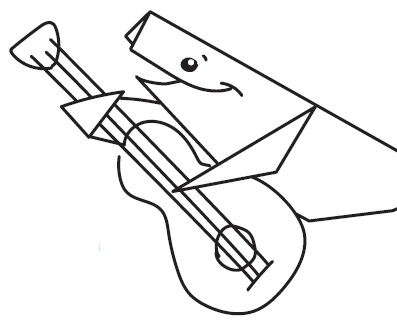Step 4: Big Goals
Now that we’ve assessed where we are by mapping our meaning, we’re going to identify our Big Goals!
Future you: time travel
Ok, Doc, hop in your Delorian and put your phone on airplane mode and out of your line of sight. Studies show that even silent phones in your view can be incredibly distracting and also decrease the amount of empathy you have towards other people, but that’s another topic...
If your phone is where you keep your calendar, you can pull it out at calendar time, but we’re not there yet. Blast into the future and have a chat with your future self. Future Goal Master has achieved some pretty impressive accomplishments, the kind that make you feel joy and satisfaction in your personal, professional and community life. A balanced life is a happy one.
When you think about your goals, write about your future vision in the present tense.
Here are some examples:
Personal goals I can play a song on the guitar, I can run a mile or a marathon, I slow down and schedule less, I have enough cash for an amazing road trip or vacation, I no longer spend mindless time on my phone, I have some great new friends.
Professional goals I network every month to find a job I like, I can code, I am promoted to the role I’d been hoping for, I have my own business.
Community goals I am a mentor in my field, I am a part of the local neighborhood association, I attend all of my nephew’s soccer games, I know my neighbors on my street.
An aside: there will rarely, if ever, be a time in your life when everything is awesome; it’s just not how humanity and life works. Unless you are a character from the Lego movie. Then everything IS awesome. The aim is not to be perfect at everything; it’s about balance and making sure that your stool is standing – a lot of time it wobbles and is uneven. That’s OK!
Did you notice all those verbs? We are 2 1/2 times more likely to achieve our goals if we describe them with specific behaviors. If goals are vague or general, we don’t know what they actually mean and then we can’t really achieve them.
Here’s an example (because examples generally clarify things):
Vague goal that is unlikely to be achieved: I want to be more active.
Specific goal that you can crush: I exercise 3 times a week for 20 minutes each time.
Why are we asking you to do this? This exercise is designed to help you map out your big goals and having clarity on them early on is important.
These are future goals, so dream big. Studies show that we tend to overestimate what we can accomplish in the short term (it’s never just 10 minutes for a trip to Target, or Tarzhay for the highfalutin) but underestimate what we can achieve in the long term. Writing one page a day could get that novel you’ve always wanted to write done in a year. You are way more of a rock star than you realize (we love air guitars!).
Write 1-3 of goals for each category. Make sure you have at least one for each and write them in the present tense. A well-balanced life is a happy one.
My Big Goals
Only 3% of the populat ion has written goals and those people are 30 times more successful than those who have no goals at all. Yes, I want 30X!
Now you have an idea of where you get meaning in your life and have outlined some of your larger goals. This is important to keep in mind as we go into a more tangible, monthly view of your priority roles, which is what we’ll do next time! Stay with us and remember snacks are your friend as you go through this process!



